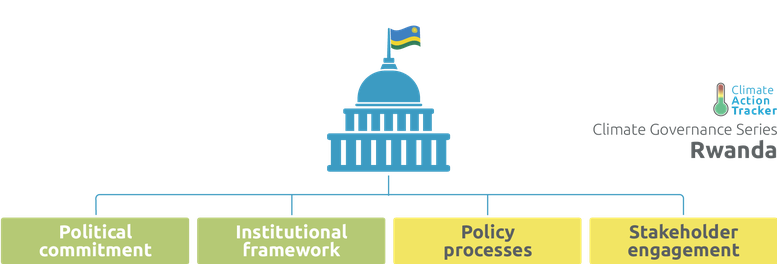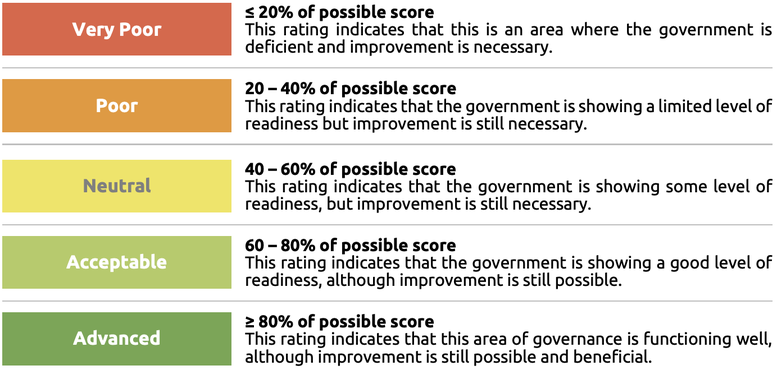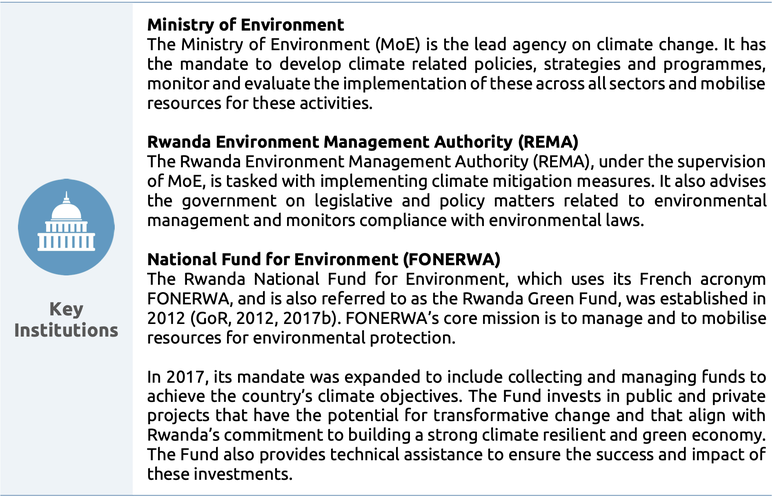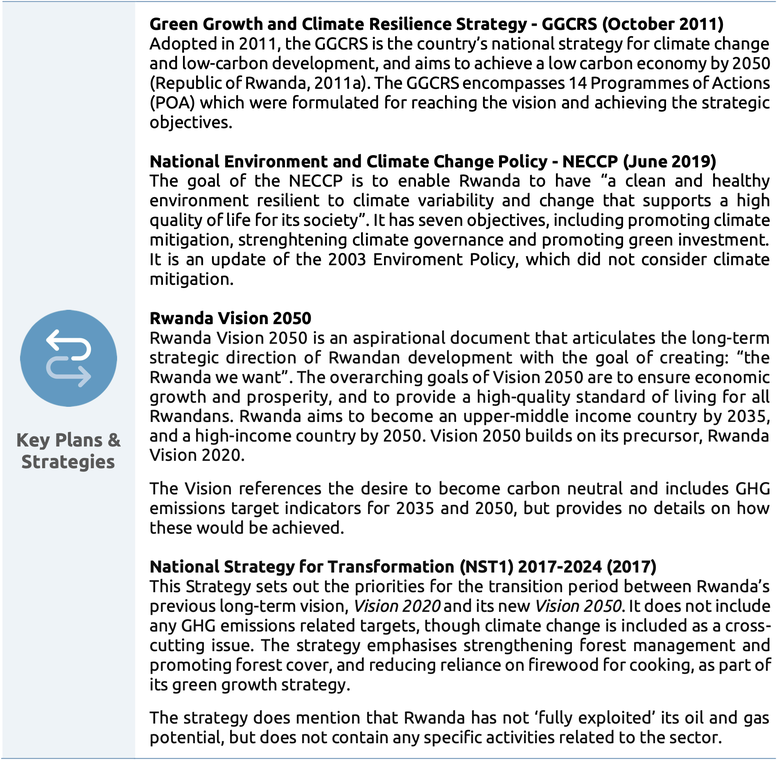Climate Governance in Rwanda
Attachments

The CAT Climate Governance series seeks to produce a practical framework for assessing a government’s readiness - both from an institutional and governance point of view - to ratchet up climate policy and implement adequate transformational policies on the ground, to enable the required economy-wide transformation towards a zero emissions society.

Our methodology
We have set up a framework that assesses and scores a number of indicators, where we rate various aspects of governance. This allows us to establish a common basis on which to compare climate governance across countries as well as identify areas of improvement and highlight positive developments. We have applied this framework at a national level only.
For more detail on our methodology, see here: methodology page.
Assessment of national level readiness
Rwandan President Paul Kagame has been committed to low carbon growth for more than a decade: his leadership has, in part, been responsible for Rwanda adopting a low carbon growth strategy in 2011. The President has also stressed the need for a shared responsibility to fight climate, and the need for climate finance on the international stage.
Line ministers often make reference to climate mitigation in their public comments and statements, indicating support and buy-in across government. Mitigation actions are included in the country’s key long and short-term plans, indicating that addressing climate change is a priority for the government.
There has been consistent climate policy development over the course of President Kagame’s regime. Given this policy consistency and Rwanda’s good rankings on various governance and anti-corruption indices, the extent to which the government can be trusted to deliver on climate action and held accountable is likely high. Analysis of opposition party manifestos suggests that there may, at least, be a continuation of current climate policy if there was a change in government. But, as it is possible that the current President may stay in power until 2034, cross-party support is likely not the decisive element for continued climate action.
Coordination amongst all levels of government could be improved. Rwanda does not have a climate- focused inter-ministerial coordination body with a clear mandate to lead and coordinate climate policy and action in the country.
Rwanda has been making efforts to mainstream climate considerations across policies for more than a decade. Rwanda’s sectoral policies are generally aligned with its broader long-term vision and planning documents. Mainstreaming will be further improved as Rwanda moves to implement its transparency framework which has a greater focus on GHG emissions tracking and indicators.
Rwanda’s knowledge infrastructure is good, but there is room for improvement. The nation does not have an entity with the explicit mandate to provide advice and analysis on transition-related policies to the government, though it does have a history of seeking technical advice during its policy development process and some sector specific entities that can play an advisory role.
Rwanda has a good level of climate finance readiness. It established the award-winning National Fund for Environment in 2012. It also has a long history of incorporating climate change considerations into its domestic budget planning processes. The 2009 report, Economics of Climate Change in Rwanda, which examined the economic costs of climate change would have on the country, is often credited as one of the reasons for Rwanda’s early action in this area.
Rwanda has committed to net zero CO2 emissions by 2050, but has not yet defined a Paris Agreement- compatible decarbonisation pathway. That said, consideration of the long-term has long been part of its climate policy process. The country lacks comprehensive climate mitigation legislation and would benefit from updating its existing laws to include its emissions targets and governance provisions.
Rwanda is in the process of establishing a comprehensive transparency framework to report, measure and monitor its climate action. The government provided a detailed overview of the institutional arrangements to track its NDC implementation. This structure builds on, and is imbedded into, the monitoring and evaluation processes that already exists as part of its national planning processes.
Rwanda does not appear to have a dedicated review mechanism focus on climate action, but will incorporate this into existing processes. Nor does it have a formal ratchet up mechanism to ensure regular review and continous updating of its NDC, though it was one of the first countries to submit its updated NDC in 2020.
Stakeholder consultation occurs regularly as part of the policy development process, though its effectiveness is not always guaranteed. A 2018 citizen report card on renewable energy projects revealed a lack of engagement with local stakeholders on decision-making matters or the monitoring of project implementation, which may inhibit local buy-in. Rwanda does not have a formal body or policy to ensure a Just Transition.
Enhancing climate-related education has long been a policy focus in Rwanda. Consideration of climate change has been incorporated into Rwanda’s basic K-12 curriculum and tertiary level programmes are being developed.
Rwandan civil society is active in the climate space. The knowledge basis to support advocacy for the transition is, however, limited. It is difficult to gauge the level of support amongst the general public for climate action, as polling data is limited.
Rating system

We analyse a number of different criteria of governance under four categories that cover the key enabling factors for effective climate action. We give each a rating as outlined above (very poor - poor - neutral - acceptable - advanced). For more detail on our methodology, click the link below.
Ratings and recommendations
The following section outlines the results of the analysis for each of the different categories and criteria as well as our recommendations for each category of governance.

- Maintain politicial commitment to climate action in order to ensure effective NDC implementation

- Establish an inter-ministerial coordination mechanism with a clear mandate and designated member actors to enhance coordination between line ministries, and between central government and district governments
- Strengthen the technical and financial capacities of Districts to integrate low carbon development issues in their District Development Plans (DDP) and to implement climate mitigation actions
- Establish an expert advisory body to support transition-related policy development

- Develop a Long-Term Strategy (LTS), including a pathway to meet the country’s 2050 net zero CO2 emissions goal
- Adopt a climate change law to enshrine the country’s NDC targets and 2050 net zero CO2 emissions goals into law as well as outline its governance framework, especially around inter- ministerial coordination

- Improve existing stakeholders consultation mechanisms to ensure better awarness and participation of beneficiaries in on- the-ground climate compatible projects/activities
- Include consideration of a Just Transition and the promotion of green jobs into the policy development process
Rwanda's Climate Governance
These tables from the report give an overview and analysis of the key factors of Rwanda's governance to enable effective climate action. We have looked at the country's key institutions, strategies, targets and legislation.




Stay informed
Subscribe to our newsletter